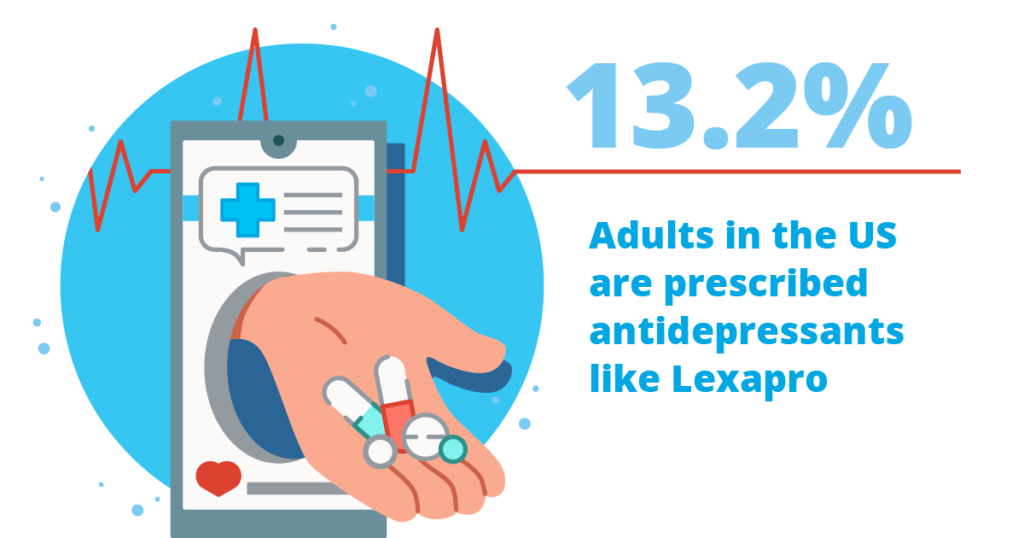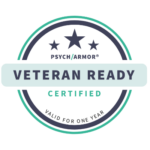Lexapro is a prescription medication commonly used to treat depression and anxiety. Like many other medications, it can cause adverse effects when combined with alcohol.
Here’s what you need to know about drinking alcohol while taking Lexapro as a treatment for depression, alcohol use disorder, or both conditions.
What Is Lexapro?
Lexapro is the brand name for a drug called escitalopram. This medication treats depression in people aged 12 years and older and generalized anxiety disorder in adults.
Lexapro is an antidepressant that belongs to a class of drugs called selective serotonin reuptake inhibitors (SSRIs). It works by increasing the brain’s amount of serotonin, a brain chemical that plays a vital role in your mood and many other bodily functions. People who suffer from depression tend to have lower amounts of serotonin in their brains than people without depression.
According to the CDC, an estimated 13.2% of adults used antidepressants like Lexapro between 2015 and 2018. Given the high prevalence of Lexapro use, it’s imperative to know what can happen if this medication is combined with alcohol.

What Are the Side Effects of Lexapro?
Lexapro can cause a wide range of side effects that become more severe when you’re drinking alcohol. According to the National Library of Medicine (NLM), Lexapro side effects include:
• Nausea and vomiting
• Diarrhea and constipation
• Stomach pain
• Loss of appetite
• Weight loss
• Decreased sexual libido
• Yawning
• Drowsiness
• Insomnia
• Shaking
• Excessive sweating
• Dizziness
• Heartburn
• Fatigue
• Dry mouth
• Flu-like symptoms
Lexapro can also cause serious side effects in some people. Serious side effects of Lexapro include:
• Allergic reaction (rash, itching, fever, hives, swelling, difficulty breathing or swallowing)
• Hallucinations
• Unusual excitement
• Joint pain
• Headache
• Poor balance and coordination
• Unusual bleeding or bruising, including nosebleeds
• Problems with memory, thinking, and concentration
• Painful or difficult urination
• Seizures
What Are the Effects Of Alcohol?
Alcohol is a depressant that produces sedative effects. It slows your heart rate and breathing to help you feel more relaxed. It also interacts with certain brain chemicals to make you feel euphoric, more confident, more social, and more of a risk-taker. If you drink too much alcohol and become intoxicated, you may also experience slurred speech, nausea, and vomiting.
Other effects of alcohol intoxication include:
• Poor judgment and decision making
• Lowered inhibitions
• Poor balance and coordination
• Inability to walk without help
• Poor vision and reflexes
• Unstable emotions
• Extreme sleepiness
• Difficulty breathing
• Memory loss or blackouts
• Loss of bladder control
• Loss of consciousness
• Coma
• Death
What Happens If You Drink Alcohol While on Lexapro?
Mixing Lexapro and alcohol can lead to a wide range of dangerous side effects. This is because Lexapro and alcohol produce many of the same effects, meaning that combining these two substances can often magnify and worsen these effects and increase your risk of hospitalization or death.
For example, Lexapro and alcohol can cause nausea and vomiting and poor balance and coordination. Using these substances together can cause severe vomiting that puts you at an increased risk of dehydration and significant impairment. It may also cause problems with balance and coordination that are severe enough to cause a dangerous fall or accident. The NLM points out that alcohol can even add to the drowsiness caused by Lexapro.
The National Institutes of Health (NIH) mentions that drinking alcohol while using Lexapro can lead to other harmful interactions as well. These include increased feelings of dizziness, depression, and hopelessness, and an increased risk for drug overdose and/or alcohol poisoning.
It’s also important to consider how alcohol and prescription medications can affect your liver health.
The liver is responsible for breaking down and metabolizing toxins and drugs so they can be effectively removed from your body promptly. However, using alcohol, Lexapro, and/or other substances all at the same time can overload your liver and make it work less efficiently. Also, the toxins from these substances can stay in your body longer to increase the risk of serious health problems and diseases, including cancer.
Can You Drink While Using Other Antidepressants Like Lexapro?
Most antidepressants and SSRIs produce similar effects, which means you probably shouldn’t drink alcohol while using another SSRI like Lexapro. Combining alcohol with any SSRI can often make you feel more depressed and anxious and worsen your mental health.
If you feel as though combining an SSRI with alcohol does a better job at treating your depression or anxiety than just an SSRI alone, talk to your doctor right away. Your doctor can talk to you about other treatments that may work better, such as switching medications or increasing the dosage of the SSRI you’re currently taking.
Is There a Link Between Alcohol and Depression?
People take Lexapro to treat their depression or anxiety. However, many aren’t aware that these same mental health conditions are long-term side effects of chronic drinking and alcohol abuse. Therefore, if you’re mixing Lexapro with alcohol, your depression or anxiety is likely to become much worse over time.
Mental health disorders are extremely common among those who suffer from addiction. According to the NIH, about half of people who experience a mental illness will also experience a substance use disorder at some point in their lives, and vice versa. Because of this, many drug and alcohol rehab centers offer specialized therapy for those who have both types of disorders.
A person with both a mental illness and substance use disorder is known to have a dual diagnosis. This is also known as co-occurring disorders. Dual diagnosis therapy at drug and alcohol rehab centers helps people learn how to live with and manage both conditions so they can lead healthier lives.
If you are currently taking Lexapro with alcohol and think you might be addicted or unable to stop, consider looking for a treatment center that offers dual-diagnosis therapy. Rehab centers that offer this therapy are highly experienced and knowledgeable about co-occurring mental illnesses and addiction.
Can I Get Addicted More Quickly if I’m Drinking While on Lexapro?
You can develop a substance use disorder if you are mixing alcohol with Lexapro. This could happen for one of several reasons.
First, if you are drinking alcohol regularly, you may develop a higher tolerance, which means you will need higher amounts of alcohol to feel its effects. Over time, as you drink higher amounts of alcohol, you increase your risk of becoming physically dependent on it.
If you’re physically dependent on alcohol, you will experience withdrawal symptoms when you suddenly drink less or stop drinking completely. Common alcohol withdrawal symptoms include insomnia, nausea, vomiting, and many others. Depression and anxiety are also common symptoms of alcohol withdrawal.
Next, addiction is a behavioral disorder. It is considered both a complex brain disorder and a mental illness characterized by a set of compulsive behaviors. This means that the more frequently you use Lexapro and drink alcohol, the higher your risk is for becoming addicted.
To be addicted to a substance or to have a substance use disorder, you must meet at least two or three criteria out of 11 diagnostic criteria. For example, you may be addicted to Lexapro and alcohol if you cannot control your urges to drink alcohol or take pills throughout the day.
Will I Have Suicidal Thoughts if I’m Drinking Alcohol While on Lexapro?
Suicidal thoughts are one of the most dangerous side effects associated with alcohol use, Lexapro use, and using these two substances together.
Lexapro medications come with an important warning about the possibility of having suicidal thoughts while using this drug. Medically reviewed clinical studies show that many children, teens, and young adults up to age 24 who were using Lexapro for depression experienced suicidal thoughts.
The warning label also says that adults of any age could experience unexpected changes in mental health when using Lexapro, including suicidal thoughts. It adds that suicidal thoughts are more likely to happen when you first start using Lexapro or when your doctor increases or decreases your dosage.
The Department of Health and Human Services mentions several clinical studies in which a link was found between alcohol abuse and suicide in those with depression. For instance, people who attempt suicide are more likely to have depression and co-occurring alcohol addiction. Also, an estimated 20% of non-traffic-related injury deaths associated with alcohol intoxication are caused by suicide.
Talk to someone immediately if you are having suicidal thoughts at any point while using Lexapro or alcohol. This side effect can be effectively treated at any mental health or addiction treatment facility.
How To Contact The Haven for Depression and Alcohol Addiction Treatment
The Haven in West Palm Beach, Florida, and Worcester, Massachusetts, offers alcohol detox and residential rehab programs for those who need help recovering from depression and alcohol addiction. If you think you may have a problem with excessive alcohol consumption, depression, and/or Lexapro misuse, we can help you get back on track with a healthier, addiction-free lifestyle.
Contact us today at (561) 328-8627 to learn more about our many available addiction treatment programs.






